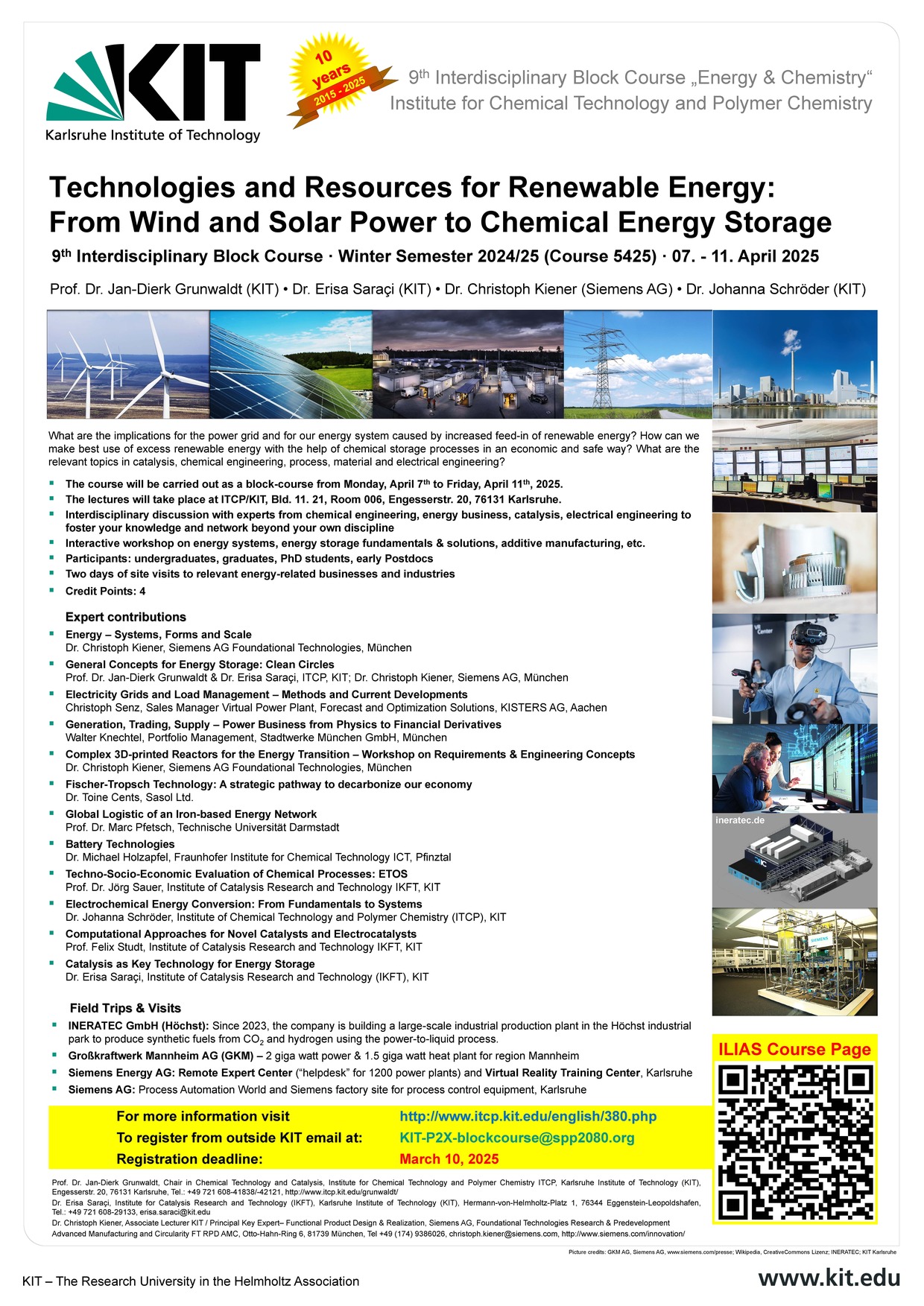Technologien und Ressourcen für erneuerbare Energien: Von Wind und Solar zu chemischen Energieträgern
- type: Vorlesung (V)
- chair: KIT-Fakultäten - KIT-Fakultät für Chemie und Biowissenschaften
- semester: SS 2024
-
time:
Mo. 08.04.2024
08:00 - 18:00, einmalig
11.21 Seminarraum 006
11.21 Chemische Technik (EG)
Di. 09.04.2024
08:00 - 18:00, einmalig
11.21 Seminarraum 006
11.21 Chemische Technik (EG)
Mi. 10.04.2024
08:00 - 18:00, einmalig
11.21 Seminarraum 006
11.21 Chemische Technik (EG)
Do. 11.04.2024
08:00 - 18:00, einmalig
11.21 Seminarraum 006
11.21 Chemische Technik (EG)
Fr. 12.04.2024
08:00 - 18:00, einmalig
11.21 Seminarraum 006
11.21 Chemische Technik (EG)
-
lecturer:
Prof. Dr. Jan-Dierk Grunwaldt
Dr. Christoph Kiener
Dr. Erisa Saraci - sws: 2
- lv-no.: 5425
| Organisatorisches | Blockkurs |
Block-course: Technologies and Resources for Renewable Energy

Technologies and Resources for Renewable Energy: From Wind and Solar Power to Chemical Energy Storage – University meets Industry!
Registration: On ILIAS (if you do not have a KIT account, please write us an Email: KIT-P2X-blockcourse∂spp2080.org)
Interdisciplinary course in collaboration with the priority program SPP2080
Location: Institut für Technische Chemie und Polymerchemie (Chemical Technlogy and Catalysis), KIT, Bld. 11.21, Room 006, Engesserstr. 20, 76131 Karlsruhe.
Organizers: Prof. Dr. Jan-Dierk Grunwaldt (KIT) • Dr. Erisa Saraçi (KIT) • Dr. Christoph Kiener (Foundational Technologies, Siemens AG)
What are the implications for the power grid and for our energy system caused by increased feed-in of renewable energy? How can we make best use of excess renewable energy with the help of chemical storage processes in an economic, safe and secure way? What are the critical and relevant topics in catalysis, chemical engineering, process engineering, electrical and mechanical engineering?
Developing technologies for the expansion of renewable energy is currently a new topic in chemistry, chemical engineering and physics. An important aspect is the distribution and optimal use of excess electrical energy. As reversible chemical reactions can release and consume large amounts of energy, chemicals and batteries are predestinated to serve as unidirectional or bidirectional energy storage systems. However, the fluctuating nature of renewable energies poses not yet mastered challenges. Additionally, collaboration between the different scientific disciplines becomes necessary. This advanced course both for master and PhD students covers both fundamental and practical problems as well as current solution strategies while involving experts from related disciplines.

